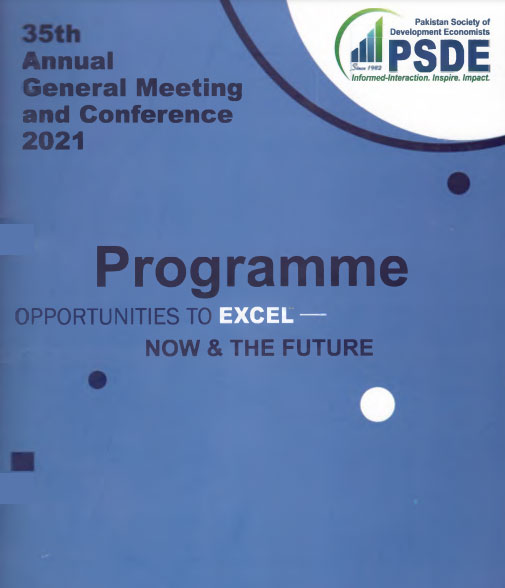REGIONAL CO-OPERATION AND ECONOMIC GROWTH
The purpose of the Annual General Meeting and Conference of the Pakistan Society of Development Economists (PSDE) is to provide a forum where leading professional economists, other social scientists, and policy-makers can exchange ideas on vital economic and social issues facing Pakistan. With the passage of time, the philosophy of development has undergone a profound change. There is now, as never before, an increasing awareness of the complexities involved in the development process which has engendered a greater sense of realism. In Pakistan’s development experience, a number of problems typically confronting developing countries in their progress towards a self- reliant economy have been tackled. These problems are complex and multi-dimensional in nature. High rates of population growth, uneven distribution of income, rising levels of poverty, low literacy rates, poor health facilities, relatively low savings rates, large internal and external deficits, and inadequate physical infrastructure for energy generation and communications threaten to nullify the modest economic gains made here, as in many other developing countries. Despite these problems, the development process in Pakistan has progressed reasonably well, although not without encountering difficulties. The Annual General Meeting and Conference of the Society is also an occasion for stock-taking of the work done, at PIDE and elsewhere, on various socio-economic problems of Pakistan, as well as for suggesting new initiatives for further research. These Meetings provide for the much-needed communication amongst the economics profession, policy-makers, and various schools of interested observers of the ongoing debate concerning development-related issues. In view of the recently signed SAFTA Agreement—to boost productivity and trade and to achieve sustained growth—the theme of this year’s conference is Regional Co-operation and Economic Growth. The Twentieth Annual General Meeting, being held on I0th-12th January, 2005, will address such important topics as agricultural productivity, industrial and international economics issues, gender and socio-economic development, demographic and health issues, science and technology for industrial growth, financial markets, human development, trade, and monetary and fiscal policy in relation to regional cooperation and economic growth in Pakistan. A highlight of this year’s Conference is the Inaugural Address by Mr Omar Ayub Khan, Minister of State for Finance. The Quaid-i-Azam Memorial Lecture, being delivered by Dr Augustine Carstens of the IMF, is titled “Making Regional Economic Integration Work”. The Iqbal Memorial Lecture, by Ms Ulla Kalbfleisch-Kottsieper of the Ministry of Law and European Affairs of the State of Thiiringen, Germany, will be on “Institutional Pre-requisites for Regional Integration: Experience of the European Union and Lessons for the SAARC Region”. The Mahbub ul Haq Memorial Lecture, by Professor M. Ali Khan of Johns Hopkins University, is titled “On Hayek’s Road to Serfdom: Sixty Years Later”. The Javed Azfar Memorial Lecture by Dr S. M. Naseem is on “Economic Growth and Development in South Asia: With and Without Regional Cooperation”. Two more Distinguished Lectures, on “Globalisation and Pakistan’s Dilemma of Development” and “The Changing Transitions to Adulthood in Comparative Perspective: the Case of Pakistan”, will be delivered by Professor Emeritus Hassan N. Gardezi of Algoma University College, Ontario, Canada, and by Dr Cynthia B. Lloyd of the Population Council, New York, respectively. A theme panel will discuss “Regional Co-operation and Economic Growth” in the context of SAARC and ECO—to review trade and highlight the future challenges and prospects of the region.
PAPERS PRESENTED AT THE 20th ANNUAL GENERAL MEETING OF PSDE – 2005
Showing 0 of 0 Results


